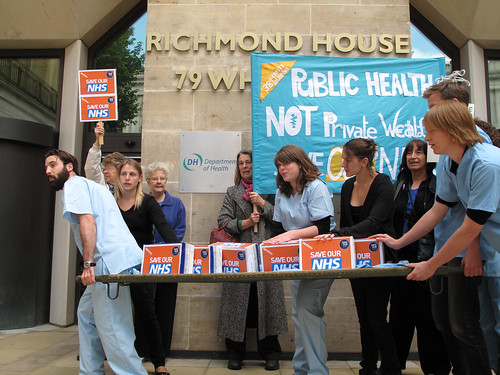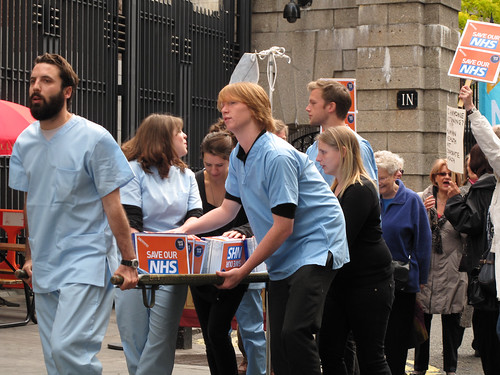The independent* Labour MP Denis MacShane is harshly criticised in a letter signed by dozens of respected academics across the country, published today on Liberal Conspiracy, ourKingdom and Crooked Timber.
He is accused of using the Parliamentary platform “to traduce the reputation of a teacher”, in a debate in the House of Commons on Human Trafficking.
On 18th May, Denis MacShane said:
My hon. Friend mentioned the London School of Economics. Is she aware of its feminist political theory course, taught by Professor Anne Phillips? In week 8 of the course, students study prostitution. The briefing says:
“If we consider it legitimate for women to hire themselves out as low-paid and often badly treated cleaners, why is it not also legitimate for them to hire themselves out as prostitutes?”
If a professor at the London School of Economics cannot make the distinction between a cleaning woman and a prostituted woman, we are filling the minds of our young students with the most poisonous drivel.
Fiona Mactaggart MP replied by stating:
I share my right hon. Friend’s view about those attitudes. I hope that the LSE provides sufficient contest to Professor Phillips’s frankly nauseating views on that issue.
The debate caused an uproar across in the academic community and several blogs have since posted about the exchange.
(* MacShane is suspended from the Parliamentary Labour Party)
Update: Denis MacShane MP has now accepted he made a mistake. In a comment posted to the ourKingdom blog he says:
Gosh, well it makes a change from the BNP and Europhobes having a go. Sorry if I have upset so many people but I have spent years fighting against the view that being obliged by debt, drugs, poverty, patriarchy, or brute force into being a prostituted woman is on a par with just another job.
I am either hopelessly behind or ahead of the times but try, try, try as a I might I do not think we will tackle the ever-increasing rates of trafficking of women and children into being commodities for male penetration and profit until we make men responsible. The prostituted women are everywhere. Their clients are nowhere. And, yes, I was upset that students should be invited to consider that the commodification of women and children should be put on a par with being a cleaner. I assume no-one has read my speech in the debate rather than my short and out-of-context intervention or other speeches or articles going back over the years on this.
I am happy to accept that I took out of context what was not seen as in any way objectionable. And I do not wish to insult LSE professors and their friends. I just wish I was 100 per cent certain that everyone who has protested has thought this through and that there is not a scintilla of concern out there in academistan that rather than posit an either/or argument a stand might be taken.
* * * * * * * *
Statement from the Association of Political Thought
During the debate on Human Trafficking on 18 May 2011 (Hansard Col 94WH) Denis MacShane MP, quoting from the list of essay titles for an academic political theory course at the London School of Economics, accused a distinguished professor, Anne Phillips FBA, of being unable to tell the difference between waged work and prostitution, and of filling the minds of students ‘with poisonous drivel’.
Fiona McTaggart MP agreed, accusing Phillips of holding ‘frankly nauseating views on that issue’.
The ineptitude of this exchange – which is now forever on the official record – is extraordinary.
Students are asked why we should distinguish between the sale of one’s labour and the sale or letting of one’s body. That condones neither the latter nor the former. It encourages students to reflect on how to draw an important line between things appropriate and things inappropriate for market exchange. Asking such questions, far from being ‘nauseating’, is central to public debate about policy and legislation.
If Members of Parliament cannot tell the difference between an essay problem and an assertion of belief how can we trust them to legislate effectively?
Parliamentary debate is a cornerstone of our constitution and political culture. However, using the privilege of a Parliamentary platform ignorantly to traduce the reputation of a teacher of political theory is a dereliction of office.
Members and supporters of the Britain and Ireland Association for Political Thought
David Owen, Southampton University
Michael Freeden, University of Oxford
Christopher Brooke, University of Cambridge
Marc Stears, University of Oxford
Simon Caney, University of Oxford
Stuart White, University of Oxford
Aletta Norval, University of Essex
Iain Hampsher-Monk, University of Exeter
Richard Bellamy, University College London
Thom Brooks, University of Newcastle
Raia Prokhovnik, Open University
Chris Brown, London School of Economics
Bonnie Honig, Northwestern University, Chicago, USA
Nicola Lacey, University of Oxford
Elizabeth Frazer, University of Oxford
Martin O’Neill, University of York
Tim Hayward, University of Edinburgh
Mark Philp, University of Oxford
Albert Weale, University College London
Kimberly Hutchings, London School of Economics
Kenneth Macdonald, University of Oxford
Chandran Kukathas, London School of Economics
Hillel Steiner, Universities of Manchester and Salford
Christopher Bertram, University of Bristol
Paul Kelly, London School of Economics
Jules Townshend, Manchester Metropolitan University
Emily Jackson, London School of Economics
Gary Browning, Oxford Brookes University
Adrian Blau, University of Manchester
Russell Keat, University of Edinburgh
David Leopold, University of Oxford
Katrin Flikschuh, London School of Economics
Cecile Laborde, University College London
Engin Isin, Open University
Dario Castiglione, University of Exeter
Clare Hemmings, London School of Economics
Christian List, London School of Economics
Evangelia Sembou, Political Studies Association of the United Kingdom
David Miller, University of Oxford
Wendy Stokes, London Metropolitan University
Ruth Kinna, Loughborough University
Joni Lovenduski, Birkbeck University of London
Moya Lloyd, Loughborough University
Cecile Fabre, University of Oxford
Adam Swift, University of Oxford
Vincent Geoghegan, Queens University Belfast
Jennifer Hornsby, Birkbeck University of London
Lynn Dobson, University of Edinburgh
David Howarth, University of Essex
Reidar Maliks, University of Oxford
Nicholas Southwood, University of Oxford
Jeremy Jennings, Queen Mary’s University of London


